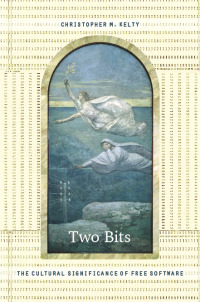Spanish Translation Project: Two Bits, by Chris Kelty

> Presentation
> This call is for
> Methodology and planning
> Contact and registrations

Presentation:
For the last three years dozens of students of Audiovisual Communication Technology at the University of Málaga Faculty of Communication has been collaborating with their lecturer in the study and Spanish edition of some of relevant works about digital technologies and networks and their links to profound political, economical and cultural changes from the standpoint of the commons (“procomún”).
Those initiatives deserve to be mentioned here: 2008 and 2009 were dedicated to Código 2.0 and Remix, by Lawrence Lessig. Students coordinated with their lecturer to deploy a descentralized cooperative production that combined the use of a wiki and on-site review meetings and were aimed to accomplish a translation for non-commercial purposes and a subsequent commercial publication (available on paper and in electronic format) as a way to enhance widespread distribution and dissemination. In this sense, Remix is still to be published in Spanish but Traficantes de Sueños already published El Código 2.0.
From the very beginning of this initiative, it has been crucial for its development the students' commitment to spread it. After the presentations at the Open Source World Conference and at Medialab-Prado, the project opened to new participants, such as collaborators from different universities and projects, including la Casa Invisible, to work on the Spanish edition of Spanish edition of The Wealth of Networks, by Yochai Benkler.
The experience was highly rewarding. Bi-monthly coordination meetings at the Commons Labs provided us with multiple suggestions and tips, such as Marga Padilla and Ana Méndez's idea of using an Etherpad for online collaborative edition, or Gabriel Lucas's ability and patience to implement it. Opening to new participants was extremely fruitful and Medialab-Prado got to invite Benkler himself (and Langdon Winner!) to celebrate a seminar about his work. While waiting for La Riqueza de las Redes to be published in Spanish, we wish to deepen this collaboration with the Commons Lab to go a step further in this learning/research process that aims to study cooperation by experimenting it, and to experiment it through its study.
That is the background for this year's project on Chris Kelty's Two Bits, an acute historical and ethnographic research about the origin and evolution of free software that goes beyond technical considerations to consider it an example of a "more general reorientation of power and knowledge". In this exploration of the "cultural significance" of free software, Kelty introduces the concept of "recursive public" ("a public that is vitally concerned with the material and practical maintenance and modification of the technical, legal, practical, and conceptual means of its own existence as a public; it is a collective independent of other forms of constituted power and is capable of speaking to existing forms of power through the production of actually existing alternatives") to catch a glimpse of its diverse "modulations" within a variety of fields, such as audiovisual creation, education, political action, synthetic biology or engineering.All in all, Kelty considers that "understanding Free Software in detail is the best way to understand many contentious and confusing changes related to the Internet, to `commons', to software, and to networks", although he specifies that Two Bits focuses on the ways to respond to those changes, rather than on their causes, arguing that "we are drowning in the why, both popular and scholarly, but starving for the how."
Therefore, we are glad to accept the invitation to "modulate" Two Bits contained in its CC-NC-SA license and confirmed by Chris Kelty himself in his last visit to Medialab-Prado, and we hope to count on anyone who shares this interest.
Access the Spanish Preface of Two Bits here.
This call is for:
Curious people in general, with a good knowledge of English and some time to devote to a publishing task requiring meticulous attention, which we aim to complete in six months. This proposal could also be appealing to hackers, biohackers and other people connected to free software, free culture and commons movements. We also encourage translators to join ;-).
Methodology and planning:
This project will rely on the cooperative learning methodology used in the experiences described above, but enriching it with the lessons derived from last year's work on Benkler's analysis of the "commons-based peer production": "a new modality of organizing production: radically decentralized, collaborative, and nonproprietary; based on sharing resources and outputs among widely distributed, loosely connected individuals who cooperate with each other without relying on either market signals or managerial commands ".
Therefore, our activities will start from the initial modularity defined by the division of the book in 11 chapters, and will welcome contributions of various granularity: ranging from the most fine-grained ones of those who only have a moment to review or translate some epigraph, or to attend the discussion seminars, to the most coarse-grained ones of those who can translate one or more chapters, organize the aforementioned seminars or attending the coordination meetings at the Commons Lab.
At the same time, we will articulate the diverse (and disseminated) contributions in a double virtual and on-site dimension. As for the former one, we will continue using Etherpad, but this time within the free social network N-1 as our main platform for the coordination, development, documentation and diffusion of the work process. As for the latter one, it encompasses local follow-up and discussion meetings (both in Málaga and Madrid) and coordination meetings at the Commons Lab (in February, April and May), as well as a final intensive seminar with Chris Kelty in Fall 2012 to be held at Medialab-Prado and la Casa Invisible. Then, we will prepare the physical and digital publication of the work and encourage subsequent "modulations" of Dos Bits.
You can read the Preface in Spanish here.
Contact and registrations:
All those interested in joining the group should contact Florencio Cabello (fcabello[at]uma.es) to get more information or register for the call.



 Medialab-Matadero Madrid
Medialab-Matadero Madrid